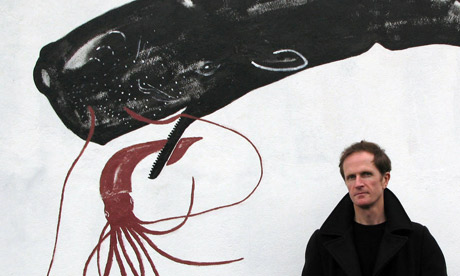Cetology

Very pleased to see that Philip Hoare has won the Samuel Johnson Prize for Non-Fiction for this year. I first came across his work last year, in the form of England's Lost Eden, which forms a major source for a current work-in-progress, and finished reading Leviathan earlier this year. To call his books 'baroque' would be something of an understatement: his latest is 453 pages long in the hardback, and his prose is... well, I'd call it mesmerising - long, slowly drifting sentences choked with adjectives and sub-clauses - while others would call it overegged (they would, of course, be wrong.) It's deeply strange that Hoare should win such recognition now: he's produced some stunning stuff already, and Leviathan has to be his least typical work. It's the most wide-ranging piece he's written: his previous books, from the biographies of Noel Coward and Stephen Tennant to ELE, have been focused on single subjects (although they took in lots of peripheral material), this is a panoptic cultural history in the vein of Richard Mabey's magnificent Beechcombings; there has also been a thread of obsession with the submerged narratives of queer history (Coward, Tennant, the 'Black Book' case, Wilfred Owen being treated at Netley hospital, the glamourous sexual ambiguity of the Girlingites) which this largely departs from - although he can't help mentioning the strange, obsessional friendship between Melville and Hawthorne, and the slightly obvious sexual symbolism of Moby Dick.
At some points - particularly during his exhaustive recounting of his own whale-watching expeditions off Cape Cod and the Canary Islands - the book becomes a bit of a slog, and Hoare isn't nearly so magnetic a writer about the natural world as proper naturalists like Mabey, Mark Cocker and Robert McFarlane. But what he can do, and does, is to re-estrange the whale - Leviathan is a science fiction story in the most literal sense. His explorations of the cultural resonances of the whale - the biographical background and strange, reckless narrative of Moby Dick and its astonishing Cold War adaptation are absolutely brilliant, and deserve reading, matching standards for pop-culture writing like Michael Bracewell's Remake/Remodel. It's these connections that linger in the mind long after the book is ended.


0 Comments:
Post a Comment
<< Home